Leaky Ductwork in Basement
After getting a very poorly rated energy audit from our electric company, I’m working diligently to get our house more air tight. Seeing lots of posts about HVAC equipment, I’m thinking ours is a little lacking. It is 5 years old, the furnace is 95% efficient. But, the black tape is falling off and according to infrared, it is leaking. I’ve attached several pictures and also infrared pictures. We are in zone 5 (NW MO). It is 20 degrees outside and our basement walls are 47 and 53 at the frost line.
Why are the ducts cold on the chute and hot on the feet? (IMG 1064) Is mastic the best approach to seal all of this? Tape? We also have the dreaded heating ducts in the attic…. maybe another post.
Is following this guide going to get me what I need? http://www.house-energy.com/Ducts/Duct-AirHandler.html
Thank you in advance for your advice
GBA Detail Library
A collection of one thousand construction details organized by climate and house part


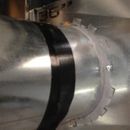
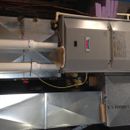
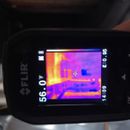
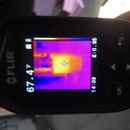
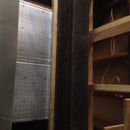

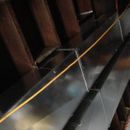
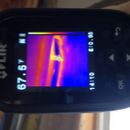







Replies
With shiny clean ducts the emissivity of the galvanized finish is low, which will appear to be a lower temperature than it actually is in an infra-red image. If it's leaking hot air and heating up the surrounding sub-floor and joists, the high emissivity of the wood would appear much closer to the true-temperature in an IR imaging system. The high emissivity of the black tape might also make it appear to be leaking in the image even if it's air tight, but get rid of it anyway- plastic backed "duct-tape" should never be used on actual ducts- it's totally worthless over the long haul, even if it isn't leaking (yet).
On really shiny-bright and clean ducts you can use a temperature rated foil tape such as Nashua 324a (found at most box stores) for sealing seams & joints, otherwise be prepared to ruin a few sets of clothes (and maybe your hair :-) ) with duct mastic. The corner/edge seams need to be sealed too, not just the joints. Seal the seams of the air handler with foil tape only, not mastic, since you may need to open it up for service later.
If your basement walls aren't insulated, that's a project well worth doing (and doing right.)
Dana, thank you! Thank is helpful. Should I get the duct insulation for the feeder ducts or the main ducts? Will it make a difference in the basement? Fiberglass or other option?
Also, Is it worth getting a duct leakage test?
Mastic is visible in at least one of your photos, but if there are many joints/seams without it, I would say yes to the duct leakage test... but only if they're going to continue to seal the ducts at the same time. There's little point in getting a test just to get the leakage number--do the actual work while the duct blaster is connected and see how far the number goes down.
Personally, I find IR almost useless on ductwork. Sometimes you can find a spot or two where hot air is blowing on an adjacent surface, but all the shiny metal makes imaging hard. A duct blaster is far more useful.
Definitely agree on insulating the basement walls.
Insulating the basement walls is a much MUCH higher priority than insulating the ducts.
Insulating the supply ducts is more important than insulating the returns.
Makes sense with the IR and reflectiveness on the ductwork. Thank you for the input. Second, while I understand the basement walls are cold, how is it affecting the overall house temperature and overall heat loss for the house? The basement is walk-out on the west side and the rest concrete. HVAC is located on the north west corner and also the same for the heat pump outside.
Becky,
Here is a link to an article on duct sealing: Sealing Ducts: What’s Better, Tape or Mastic?
Here is a link to a relevant video: Duct Sealing and Leak Testing.
Here is a link to an article on insulating basement walls (and note that the article also discusses basement floors): How to Insulate a Basement Wall.
>>I understand the basement walls are cold, how is it affecting the overall house temperature and overall heat loss for the house?
You're losing heat through the floor to the cold basement, and you're losing heat from the ductwork to the cold basement. If you insulate the concrete walls (and perhaps the concrete floor, although you probably wouldn't), the basement will be warmer and less heat will be lost through the first floor and from the ductwork.